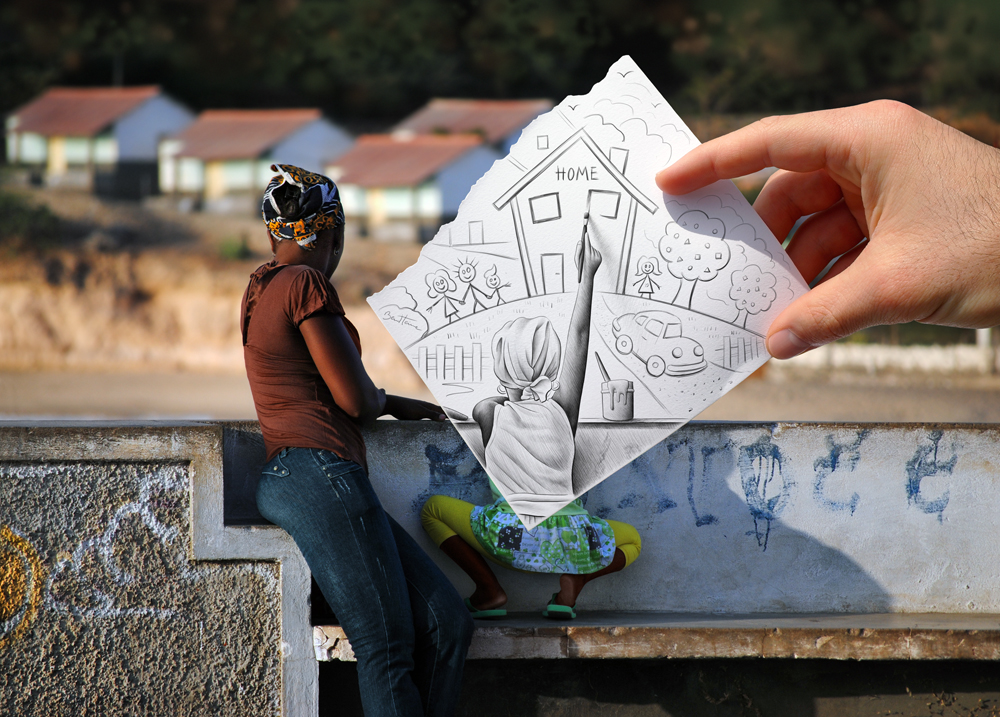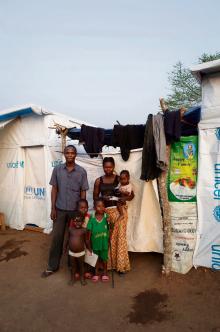By Peder Frederik Jensen
Translated from Danish by K.E. Semmel
The refugee camp Guiwa is located in a clearing out in the bush, and stretches across the hilly landscape of eastern Cameroon. It’s late afternoon. People are getting ready for the evening. They collect water at the well, while a flock of teenagers stand chatting at the pump. The youngest children play. A man approaches the car. He’s well dressed. He bids us welcome, and Hamdiata Dialo asks how he is doing. Does he need anything?
The man throws up his arms. Of course. A home would be nice, or peace in the Central African Republic (CAR), his homeland. Like most everyone in this camp he’s from Bangui—CAR’s capital—and is therefore not used to living in the countryside.
What do they need? Educational and employment opportunities for one’s children? A functioning democracy, health, a world without all the destructive corruption?
Probably so, but the man just gestures with his arms, smiling.
“We need blankets,†he says.
The nights are cold, and they are forced to sleep on bare ground.
They also lack the necessary paperwork that determines whether they have to migrate further or can remain here in this camp on a minimum of food and other necessities delivered by the UN’s refugee organization (UNHCR). They also grow a few crops here, though as city dwellers they’re not qualified to cultivate. People refer to Canada as the Promised Land.
*
Hamdiata nods and listens. He is my guide and interpreter. We’ve come from Garoua-Boulaï, the northern border crossing to the Central African Republic. On the way we’ve visited some of the more than 300 groups living in the region. People who, through the years, have fled from their unstable homeland.
Since March 2013, when CAR’s Michel Djotodias seized power in a violent coup—the latest in a long chain of rebellions that have plagued the country and left their mark since its independence from France in 1960—the number of refugees has increased. On January 10, Djotodias stepped down as president, opening up a fresh wave of violence.
When Jean-Bédel Bokassa, one of post-colonial Africa’s most infamous dictators, stormed to power in 1965, with President de Gaulle’s and France’s blessing, he became the first in a series of leaders with no interest in democracy. Bokassa was busy buying homes and mansions in Europe, building palaces, murdering and repressing his people and pilfering the state—and he was occupied with his sexual escapades, and cannibalism. Evidence suggests that he consumed his enemies and that, over a period of years, he managed to serve human flesh to the European dignitaries who visited his country. A case in point: When he was finally removed from power, the partly dismembered remains of a murdered mathematics teacher were discovered in a freezer in his private home.
Parliamentarianism has been introduced on multiple occasions, yet each time there is a successful election, it takes only a few years before a new rebellion removes the democratically-elected leader and inserts a new despot.
All this serves as a kind of backdrop to my visit. The people who live out in the bush are not casualties of history. They are not an appendage to the catastrophe “down there in Africa.†They are human beings who desire a life worth living, who dream of reaching the big cities and getting an education. They are people who live under unfortunate conditions. Few dream of going home to CAR. The country is done, they say and shake their heads.
*
It has taken some time to slip through to UNHCR. A misunderstanding somewhere in the organization has delayed my entrance into its sanctified halls. When I arrived at its regional headquarters in Bertoua, I couldn’t get farther than the guard. I sat on a plastic chair in the shade, and waited while my papers and a letter from the Foreign Ministry were inside, being deliberated with the authority in charge, who claimed she could not receive me. She insisted that I provide a letter from the capital explaining my interest and the reason for my visit. In other words: The woman to whom I had twice written in advance of my trip wouldn’t deign to give me so much as one minute of her valuable time.
She needed clearance from the capital.
But I had all my paperwork in order. I had written to UNHCR in Cameroon and the Scandinavian office in Stockholm several weeks in advance, I had telephone conversations, and I had held a meeting with the organization’s communication’s delegate in Yaundé, the capital of Cameroon; but she had never properly assumed responsibility for my stay, and hadn’t involved the upper management, and without their blessing you don’t get any farther than the guard. Without the director’s knowledge, you are nothing more than a strange and incomprehensible blanche (white man), who comes calling with his demands.
*






